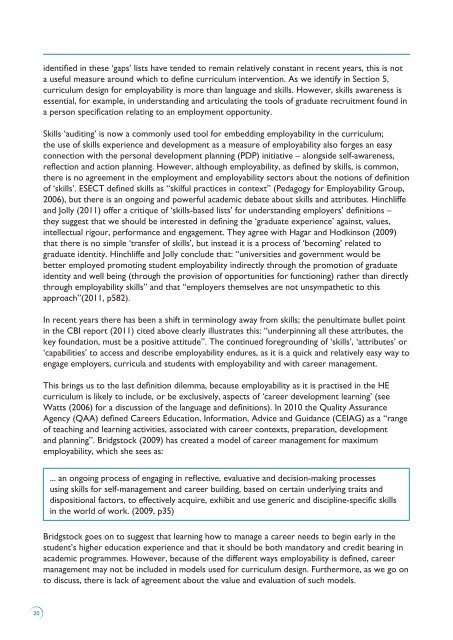Pedagogy for employability - Higher Education Academy
Pedagogy for employability - Higher Education Academy
Pedagogy for employability - Higher Education Academy
Create successful ePaper yourself
Turn your PDF publications into a flip-book with our unique Google optimized e-Paper software.
identified in these ‘gaps’ lists have tended to remain relatively constant in recent years, this is not<br />
a useful measure around which to define curriculum intervention. As we identify in Section 5,<br />
curriculum design <strong>for</strong> <strong>employability</strong> is more than language and skills. However, skills awareness is<br />
essential, <strong>for</strong> example, in understanding and articulating the tools of graduate recruitment found in<br />
a person specification relating to an employment opportunity.<br />
Skills ‘auditing’ is now a commonly used tool <strong>for</strong> embedding <strong>employability</strong> in the curriculum;<br />
the use of skills experience and development as a measure of <strong>employability</strong> also <strong>for</strong>ges an easy<br />
connection with the personal development planning (PDP) initiative – alongside self-awareness,<br />
reflection and action planning. However, although <strong>employability</strong>, as defined by skills, is common,<br />
there is no agreement in the employment and <strong>employability</strong> sectors about the notions of definition<br />
of ‘skills’. ESECT defined skills as “skilful practices in context” (<strong>Pedagogy</strong> <strong>for</strong> Employability Group,<br />
2006), but there is an ongoing and powerful academic debate about skills and attributes. Hinchliffe<br />
and Jolly (2011) offer a critique of ‘skills-based lists’ <strong>for</strong> understanding employers’ definitions –<br />
they suggest that we should be interested in defining the ‘graduate experience’ against, values,<br />
intellectual rigour, per<strong>for</strong>mance and engagement. They agree with Hagar and Hodkinson (2009)<br />
that there is no simple ‘transfer of skills’, but instead it is a process of ‘becoming’ related to<br />
graduate identity. Hinchliffe and Jolly conclude that: “universities and government would be<br />
better employed promoting student <strong>employability</strong> indirectly through the promotion of graduate<br />
identity and well being (through the provision of opportunities <strong>for</strong> functioning) rather than directly<br />
through <strong>employability</strong> skills” and that “employers themselves are not unsympathetic to this<br />
approach”(2011, p582).<br />
In recent years there has been a shift in terminology away from skills; the penultimate bullet point<br />
in the CBI report (2011) cited above clearly illustrates this: “underpinning all these attributes, the<br />
key foundation, must be a positive attitude”. The continued <strong>for</strong>egrounding of ‘skills’, ‘attributes’ or<br />
‘capabilities’ to access and describe <strong>employability</strong> endures, as it is a quick and relatively easy way to<br />
engage employers, curricula and students with <strong>employability</strong> and with career management.<br />
This brings us to the last definition dilemma, because <strong>employability</strong> as it is practised in the HE<br />
curriculum is likely to include, or be exclusively, aspects of ‘career development learning’ (see<br />
Watts (2006) <strong>for</strong> a discussion of the language and definitions). In 2010 the Quality Assurance<br />
Agency (QAA) defined Careers <strong>Education</strong>, In<strong>for</strong>mation, Advice and Guidance (CEIAG) as a “range<br />
of teaching and learning activities, associated with career contexts, preparation, development<br />
and planning”. Bridgstock (2009) has created a model of career management <strong>for</strong> maximum<br />
<strong>employability</strong>, which she sees as:<br />
... an ongoing process of engaging in reflective, evaluative and decision-making processes<br />
using skills <strong>for</strong> self-management and career building, based on certain underlying traits and<br />
dispositional factors, to effectively acquire, exhibit and use generic and discipline-specific skills<br />
in the world of work. (2009, p35)<br />
Bridgstock goes on to suggest that learning how to manage a career needs to begin early in the<br />
student’s higher education experience and that it should be both mandatory and credit bearing in<br />
academic programmes. However, because of the different ways <strong>employability</strong> is defined, career<br />
management may not be included in models used <strong>for</strong> curriculum design. Furthermore, as we go on<br />
to discuss, there is lack of agreement about the value and evaluation of such models.<br />
20

















